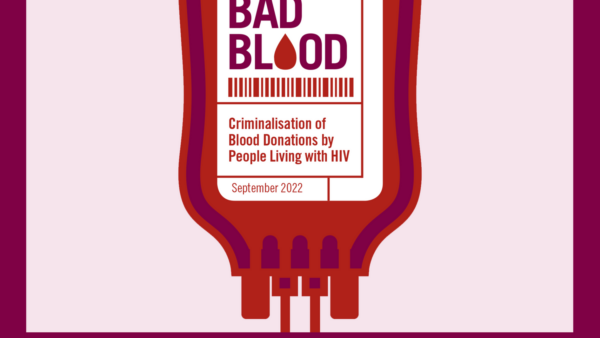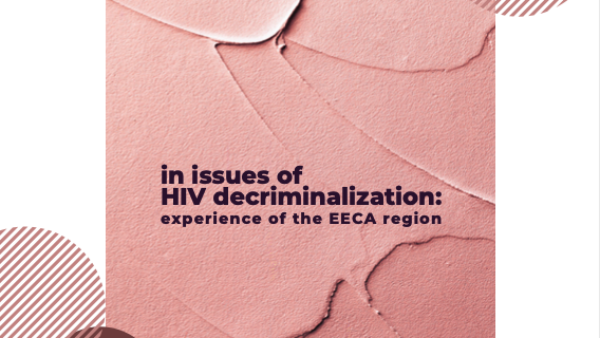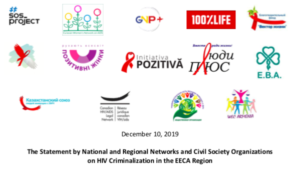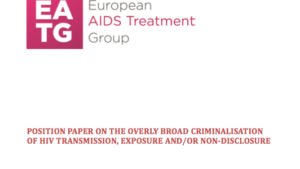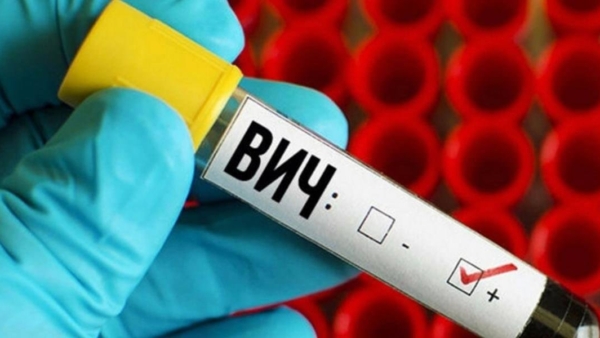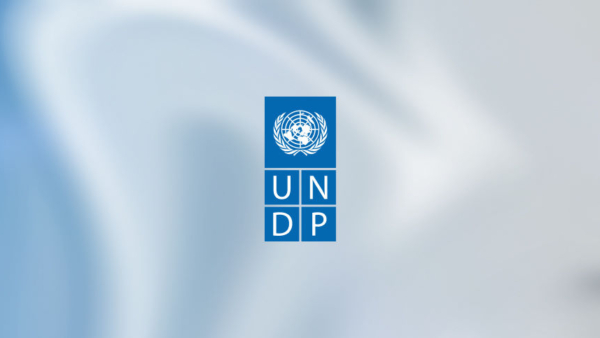Overview
Ukraine introduced a criminal law in 1998 which prohibits ‘exposure’ to and transmission of HIV or ‘any other incurable contagious disease dangerous to human life’. Although transmission of other venereal diseases is criminalised under a different provision, the penalty provided is lower. There is also a HIV omnibus law which provides protections and responsibilities for people living with HIV.
Article 130 of the Criminal Code criminalises ‘knowingly placing of a person in danger of HIV exposure or any other incurable contagious disease dangerous to human life’ with a penalty of imprisonment for up to three years. Transmission by someone aware of their status is punishable by two to five years’ imprisonment, or three to eight years where transmission occurs to a minor or two or more people, while deliberate transmission is liable to five to ten years’ imprisonment.
There is no requirement for malicious intent nor actual transmission under Article 130. Furthermore, what constitutes ‘danger of exposure’ is not defined, however case law demonstrates this includes unprotected sex, biting, and blood donations, and may include other conduct such as sharing needles etc. Criminal liability could also be assumed based on ‘risky’ behaviour (for example if they are injecting drug users) even without an HIV-positive diagnosis.
Originally, Article 130 contained provisions mandating HIV disclosure prior to any activity that may risk infection, and also mandated that newly diagnosed individuals must also undergo a period of compulsory hospitalisation during which it is expected that they will sign an undertaking to obey this law. These provisions are no longer in place. In May 2021 it was reported that the Ministry of the Interior was developing a draft revision to Article 130 which would remove specific reference to HIV while at the same time increasing the penalties available for ‘exposure’ to communicable diseases, however this amendment has not materialised.
Article 131 criminalises the transmission of HIV or another incurable infectious disease as a result of medical negligence. A doctor from the Donetsk region was found guilty of transmitting HIV to three children in 2005 and sentenced to five years imprisonment in 2012.
The transmission of other sexually transmitted infections is criminalised under Article 133, with a lower penalty of up to two years’ imprisonment, increased to up to three years in the case of minors or multiple people.
In 2017, international and national stakeholders assessed the political and legal environment in the relation to the HIV response in Ukraine and recommended the repeal of Articles 130 and 133 of the Criminal Code as well as the removal of references to HIV from other articles that could be used in the context of criminal liability. Further advocacy highlighted the fact that the HIV criminalising provisions of the Criminal Code of Ukraine contradicted the implementation of the HIV response as set out by the state policy.
In October 2024, it was reported that lawmakers were introducing a bill to repeal Article 130 to address the rising HIV rates in Ukraine. Following advocacy by civil society, in March 2025, this bill, ‘On Amendments to the Criminal Code of Ukraine to Improve Criminal Liability for Infection with Infectious Diseases or Infection with their Pathogens’, was approved by parliament at first reading, and awaits final approval. The bill would repeal Article 130 and allow for criminal liability under Article 121 for anyone who causes transmission of a ‘particularly dangerous infection’. This eliminates discriminatory treatment of HIV in the Criminal Code.
Statistical information provided by the State Judicial Administration of Ukraine on the number of persons convicted of crimes under Article 130 of the Criminal Code, reported 73 convictions between 2003 and 2018. However, this data does not disaggregate between people living with HIV and other incurable diseases, which are both included under Article 130. In its 2018-2022 Criminalisation Scan in Eastern Europe and Central Asia, the Eurasian Women’s Network on AIDS (EWNA) reported 14 convictions for HIV ‘exposure’, 10 for HIV transmission, and four for aggravated transmission. In 2020, it identified seven registered cases under Article 130, two resulting in prosecution, and five investigations in 2021 with no prosecutions, however the circumstances of these cases are not known. We have not received any reports of HIV cases since 2016.
As well as the Criminal Code, Ukraine has an HIV-specific statute, The law on the response to the spread of diseases caused by the human immunodeficiency virus (HIV), and the legal and social protection of people living with HIV. Article 12 of this law imposes a number of responsibilities on people living with HIV, including disclosing HIV status to partners, and refraining from donating blood or other fluids, organs or tissues (see our report, Bad Blood, for a global analysis of the criminalisation of blood donations). Article 7 mandates counselling for those diagnosed as living with HIV, during which the person is informed about measures to avoid transmission as well as potential criminal liability for ‘exposure’ and transmission. Article 11 permits doctors to disclose a patient’s HIV status to their partner(s) where the patient has not adopted changes to their behaviour as recommended in counselling.
Although this HIV statute was updated in January 2023 to strengthen social protections for people living with HIV, including on access to healthcare, testing, and other services, this revision did not amend the restrictions on behaviour outlined above.
Laws
Criminal Code
Section 2 – Criminal Code of Ukraine, Crimes against life and health
Article 130. Infection with HIV or any other incurable contagious disease
Part 1. Knowingly placing of a person in danger of HIV exposure or any other incurable contagious disease dangerous to human life, – is punished by arrest for a term up to three months, or by restraint of liberty for a term up to five years, or imprisonment for a term up to three years.
Part 2. Infection of another person with HIV or any other incurable contagious disease by a person who was aware of himself or herself being a carrier of this virus, – is punished by imprisonment for a term of two to five years.
Part 3. Acts envisaged in part 2 of this Article, committed against two or more persons or a minor, – is punished by imprisonment of three to eight years.
Part 4. Deliberate contamination of another person with HIV or any other incurable contagious disease dangerous to the person’s life, – is punished by imprisonment for a term of five to ten years.
Article 131. Inappropriate fulfillment of professional duties resulting in infection of a person with human immunodeficiency virus or other incurable infectious disease
1. Inadequate performance by a medical, pharmaceutical or other employee of his professional duties as a result of a careless or dishonest attitude towards them, which entails infection of a person with human immunodeficiency virus or other incurable infectious disease that is dangerous to human life, –
the applicable sentence is the restriction of liberty for a term of up to three years or the deprivation of liberty for the same term with the deprivation of the right to occupy certain positions or engage in certain activities for a term of up to three years.
2. The same act, if it entailed the infection of two or more persons, –
the applicable sentence is deprivation of liberty for a term of three to eight years, with the deprivation of the right to occupy certain positions or engage in certain activities for a term of up to three years.
Criminal Code
Article 133. Infection with a venereal disease
1. Infection of another person with a venereal disease by a person who knew that he had this disease, –
shall be punished by correctional labor for a term of up to two years, or arrest for a term of up to six months, or restriction of liberty for a term of up to two years, or imprisonment for the same term.
2. The actions provided for in the first part of this article, committed by a person previously convicted of contracting another person with a venereal disease, as well as the infection of two or more persons or a minor
shall be punished by restraint of liberty for a term of up to five years or imprisonment for a term of up to three years.
3. The actions provided for by parts one or two of this article, if they entail grave consequences, –
the applicable sentence is deprivation of liberty for a term of two to five years.
The law on the response to the spread of diseases caused by the human immunodeficiency virus (HIV), and the legal and social protection of people living with HIV (AIDS Law) in Ukraine
Article 7. Notification of HIV testing results and post-test counseling of HIV-infected persons
(…)
2. Qualified post-test counseling is a mandatory component of HIV testing, during which a person diagnosed with HIV must be informed about preventive measures necessary to maintain the health of an HIV-infected person, prevent the further spread of HIV, about guarantees of compliance rights and freedoms of people living with HIV, as well as criminal liability for knowingly putting another person at risk of infection and/or contracting HIV.
During post-test counseling, the employee of the institution that conducted the test has the right to offer the person who has been diagnosed with HIV, with her consent, to inform her partner(s) about the risk of HIV infection and to provide recommendations on the need for HIV testing and the use of preventive measures.
Article 11. Additional measures that a doctor can take to prevent the spread of HIV
1. If post-test counseling has not led to changes in the behavior of a person living with HIV, necessary to maximally reduce the risk of HIV transmission to a partner(s), then a doctor who provides medical services to such a person in connection with a disease caused by HIV must re-explain to her the measures she must take to prevent the further spread of HIV, as well as offer, with her consent, to inform her partner(s) that he (she, they) has been exposed to the risk of HIV infection, and provide recommendations on the need for testing on HIV and the use of preventive measures to prevent HIV infection.
2. If the doctor’s repeated explanation of the need to take preventive measures specified in part one of this article did not lead to changes in the behavior of a person living with HIV, necessary to maximally reduce the risk of HIV transmission to other persons, and also if a person living with HIV, refused to give consent to the doctor warning her partner(s) that he (she, they) was exposed to the risk of HIV infection, the doctor has the right, without the consent of this person, to inform the specified partner(s) that he (she, they) ) was exposed to the risk of HIV infection, and provide recommendations on the need for HIV testing and the use of preventive measures to prevent HIV infection.
When submitting such a notification, it is forbidden to disclose the data of a person living with HIV, as a result of contact with whom the partner (partners) could become infected, as well as to report any circumstances that may reveal the data of this person.
Article 12. Responsibilities of People Living with HIV
1. People living with HIV are obliged to:
1) take measures to prevent the spread of HIV infection by health authorities;
2) inform the persons who were their partners before the detection of the fact of infection about the possibility of their infection;
3) refuse to donate blood, its components, other biological fluids, cells, organs and tissues for their use in medical practice.
2. In case of non-fulfilment of the obligations defined in the first paragraph of this article, people living with HIV from among foreigners, as well as stateless persons, who by their behaviour endanger the health, protection of rights and legitimate interests of Ukrainian citizens, may be expelled outside Ukraine in the manner prescribed by law.
Further resources
Authors: Eurasian Women’s Network on AIDS (EWNA)
Regional HIV criminalisation report that summarises the state of play regarding HIV criminalisation laws and known prosecutions in the EECA region.
Authors: Eurasian Women’s Network on AIDS (EWNA)
Regional HIV criminalisation report that summarises the law and prosecution data in each country in the EECA region.
HIV Justice Network's Positive Destinations
Visit the Ukraine page on Positive Destinations for information on regulations that restrict entry, stay, and residency based on HIV-positive status, as well as access to HIV treatment for non-nationals.



